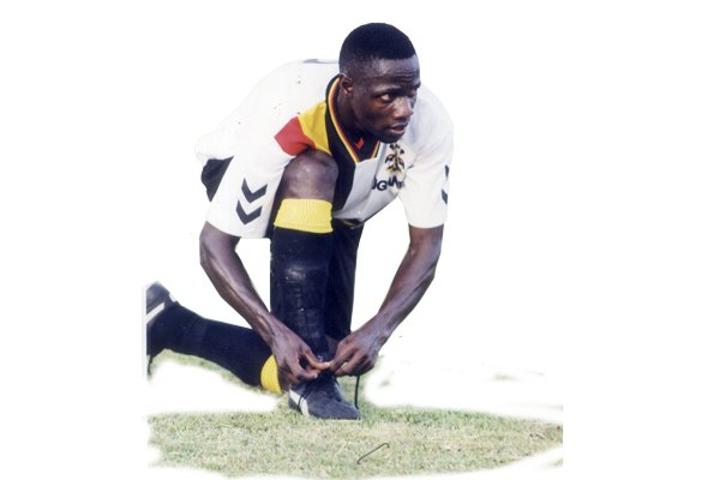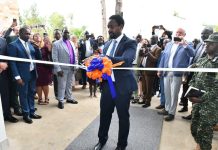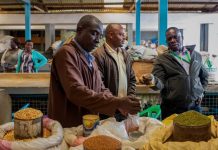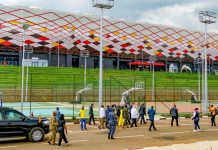Africa-Press – Uganda. PHILLIP OBWIN
Obwin was such an important player at Express that his intended transfer to rivals Villa in 1996 almost caused a ‘world war’. When the rumour spread, some Express fans attempted to vandalise Obwin’s home and loot property to show their anger.
To this day, it remains one of the most controversial and longest transfer saga locally. It is reported that Villa hatched a master plan to ‘steal’ Obwin soon after he masterminded Express’ great 199 season.
They won a league and cup double. Upon crowning, Express announced that Obwin had left the country for trials in Turkey. The Red Eagles clearly didn’t know where he was and what to tell the fans.
The player was sighted with a top Villa official heading to Fufa offices to work out a transfer. Thanks to Fufa, they wisely cooled down the situation. Fufa contacted Express to negotiate a compensation and let Obwin join a club of his choice. It was a tug-of-war as Express never wanted to hear of it.
He had played across the backline and as a striker that season. Losing him was unimaginable after his three-year spell from 1992. Villa eventually got him for a fee in the region of Shs6m.
The nomad in him saw Obwin return to Wankulukuku in 1998 as Villa sacked a host of senior players at the end of the 1997 on grounds of lack of loyalty.
There were bridges burnt permanently as he rejoined Villa in 2002 under under coach Milutin Sredojevich Micho making Shs5m.
However, in 2004, he joined URA. Obwin played there until 2007 when Nalubaale FC courted him with a big cash offer. But the dysfunctional Nalubaale compelled him to return to Express, where he played until July 2010 when he retired. In this period, he won countless titles at club level with Express, SC Villa and URA. At Villa Park, Obwin won three league titles, a Uganda Cup and a Cecafa clubs’ title. In 1992, during his first season with Express, Obwin was part of the team managed by David Otti that beat Polly Ouma’s Nile in the Uganda Cup final.
The following season Express won the league for the first time in 18 years and on this added on the historic double of 1995 among other achievements.
He will never forgive Express for denying him a chance of going for successful trials at English club Portsmouth.
Obwin and Fred Tamale’s travel schedule was deliberately delayed and by the time they arrived in the UK the club had already filled their places.
In 2009, at 35, Obwin shocked many when sought to return to Villa. When asked by The Observer why not call it quits rather than playing with young players that were fit enough to be his sons, Obwin did not agree.
“I am disciplined, live healthy and still train hard. Once my hunger for football dies, then I will stop signing contracts with football clubs,” he argued. For all that movement, he was Mr. Consistent for both club and country. Obwin was one of the most influential players for Uganda Cranes in his era.
He scored Uganda lone winning goal against Ghana’ Black Stars at Namboole in 2002 during the 2004 Africa Cup of Nations qualifiers.
Starting at right back, he single-handedly initiated a move deep from the defence and raced with the ball with a sprinter’s speed to the Ghanaian goal and scored.
This was against strong Ghana side that had Stephen Appiah, Sammy Kuffour and Sulley Muntari. Earlier on in the 2000 edition of the Castle Cup held in Nairobi, Kenya it was again Obwin that scored Cranes’ winner against Ghana, a penalty in the 88th minute for Uganda to carry the day with a 2-1 victory.
In 1998, as Uganda massacred Rwanda’s Amavubi Stars 5-0, Obwin started as a striker and he along with Joseph Mutyaba supplemented Magid Musisi’s hat trick. Obwin was a mainstay throughout the decade stretching between 1994 and 2004 winning the 1996 and 2000 Cecafa Senior Challenge Cup titles. He was the top scorer at Cecafa 1996. While appearing on Capital FM’s Desert Island Discs in 2012, Obwin narrated the sad way in which he and Mutyaba were victimized and consequently thrown out of the Cranes residential camp by coach Mohammed Abbas in 2004.
The Egyptian found a group players watching television beyond midnight and surprisingly singled out and punished only the pair. It was this injustice that forced Obwin to walk away from the national team.
Known for his fragile temperament, in his later life, Obwin, along with a group that had other ex-players led by Dan Walusimbi invaded the Fufa headquarters and broke the door citing illegality in the way the federation was constituted.
OBWIN FACTFILE
(ACHIEVEMENTS)
λ Played for Express, SC Villa, URA and Nalubaale among other clubs.
λ Was part of Express team that won 1993 league – the first time in 18 years.
λ During his first season at Express, he won the 1992 Uganda Cup.
λ Won the double with Express in 1995.
λ Won a double at SC Villa in 2002 and the league in 2003.
λ Won the Hedex Cup with Express in 1995.
λ Won the Cecafa Kagame Cup with SC villa in 2003.
λ Won league with URA in 2006 & 2007.
λ Reached the Cecafa Kagame Cup finals in 2007 and 2008 with URA.
λ Played for Cranes from 1994 to 2004.
λ Scored Uganda solitary winning goal in the first-ever win over Ghana in a 2004 Afcon qualifier.
λ Played in all defence positions at Express.
λ Won the 1996 and 2000 Cecafa Senior Challenge Cup titles with the Cranes.
λ During the 1996 Cecafa, he won the Golden Boot having scored three goals.
λ English club Portsmouth FC once sought his services.
JAMES ODOCH
Odoch belongs to the elite club of footballers that were first summoned to the national team while still playing for clubs in lower leagues. That basket includes Phillip Omondi, Moses Nsereko, Jimmy Kirunda, Tom Lwanga and Leo Adraa all of whom were too good to be under looked before they made the big stage.
In the case of Odoch, his first call calling came when he was featuring for first division side Police then managed by former Fufa boss and Uganda Cranes winger Denis Obua (RIP).
He was a senior five student at Lubiri SSS. He particularly talks of a first division match between Police and rivals Chicago saying that it was perhaps the one that opened the door for him.
The match played at Nsambya Railways ground attracted a big crowd including a number of coaches in the top division then.
During the match the schoolboy was stellar and crowned it with Police’s winning goal – a thunderous strike from the middle of the pitch that sent the crowd into deafening cheers.
Early Starter. Odoch was summoned to the Uganda Cranes team while a Division One player and an A-level student at Lubiri SSS. He went on to feature for the Cranes second string side that reached the 1995 Cecafa final. PHOTO | EDDIE CHICCO
A few days later, his father, Onoo Lagro, a police constable, returned home in a very jolly mood while waving a newspaper copy.
“He shouted and informed me that my name was in the newspaper on the published list of players that had just been summoned to the Cranes team that was due to prepare for the Cecafa tournament that was to be hosted by Uganda. I told dad that it was impossible and that maybe they were referring to another Odoch and not me,” Odoch reminisces.
As hosts, Uganda was required to field two teams – Cranes A and B. Because of his tender age and size, Odoch was picked for B for the less experienced players while Cranes A was the first team.
Odoch’s and his mates ent all the way to the final and narrowly lost 0-1 to Zanzibar while Cranes A fell by the wayside and never progressed beyond the group stages.
The following year Odoch was included in the Cranes team that went to Sudan for another edition of Cecafa Senior Challenge Cup and featured in the opening 1-1 draw with the host nation.
From then on, Odoch grabbed a permanent place in the national team featuring in either midfield or on the right wing. He was revered for his aggression that contradicted his small body structure.
The memories of long range shots and brilliant free kicks remain fresh.
At club level, Odoch left Police for Express in 1997 before relocating to Villa in 1999. He went back to Express in 2001. Other clubs he played for included APR (Rwanda), Thanh Hoa (Vietnam) and Brother Union of Bangladesh.
At Villa, he won two league titles but lost two Cecafa Club Championship finals on spot kicks to Tanzania’s Yanga.
That Villa side had Andrew ‘Fimbo’ Mukasa, Edgar Watson, Hakim Magumba, Joseph Mutyaba, Geoffrey Bukohore, Aggrey Bigala, Deo Sserwadda and Chris Kayemba.
With Express, Odoch won 1997 Uganda Cup and 2001 Hedex Cup. In Rwanda, APR won the double in 2003 and 2004 plus a treble in 2005 that included the league, cup and Cecafa Clubs’ title.
Odoch, who holds a CAF B coaching license, is currently assistant coach at his former club Express and has previously had coaching stints at URA, Wakiso Giants and Nyamityobora among others.
ODOCH FACTFIlE
(ACHIEVEMENTS)
λ Played for Uganda’s top clubs Express (two spells) and SC Villa.
* Summoned to Cranes while a first division player and student at Lubiri SS.
* Was in Cranes second string side that reached the 1995 Cecafa final.
* Played an instrumental role in the promotion of Police to Super Division.
* Was part of dominant 1999 Villa side.
* Won two league titles with SC Villa in 1999 and 2000.
* Won Uganda Cup with Express in 1997 and 2001.
* Won Hedex Cup with Express in 1997.
* Won a double with APR (Rwanda) in 2003 and 2004.
* Won a treble with APR (Rwanda) in 2005; League, Cup and Cecafa.
* Holds a Caf B Coaching Licence.
* Currently assistant coach at Express.
* Has had coaching assignments at URA, Wakiso Giants and Nyamityobora.
SAM SSIMBWA
Ssimbwa is one you would call a true ‘Mulangira’ (a Prince in Buganda culture). A man of high self-esteem who think privilege is the least he deserves.
When it comes to football, Ssimbwa can however rightly be referred to as having been a real prince of the sport at the peak of his career. I first saw this crafty boy playing for Kitante Hill School during the post primary football competition of the 80s.
After Kitante, Ssimbwa joined Kibuli SSS for advanced level education and it was this school that then took football more seriously that helped to polish his otherwise hidden immense talent.
Coaching Maverick. Ssimbwa earned the moniker, the Mourihno of East Africa because of his coaching prowess. He has also been assistant to Mohammed Abbas in 2005, then to Lazso Csaba and then finally to Bobby Williamson, before crossing to Kenya’s Sofapaka. PHOTO | JOHN BATANUDDE
His first club football came around 1986 when he joined KK Cosmos and played for the club during that year’s super mini league. KCCA spotted him in 1987 but didn’t sign him as he was concentrating on his A level exams.
When all was done, Ssimbwa joined KCCA and a baptism of fire during his league debut as Bukiwe Red Stars dominated the Lugogo side.
He improved quickly and built a telepathy with Jackson Mayanja and George Nsimbe. Ssimbwa and Mayanja had known each other before while at school and their school teams of Kibuli and Kololo SSS were rivals and the ones that used to dominate post primary football competitions then.
Now here, they were playing for the same club. There was still no love lost between the two and the rivalry continued even at KCCA with each one of them trying to impress and prove that he was better than the other.
According to one KCCA fan, whenever Ssimbwa had the ball there was one teammate he was not likely to pass it to and this happened to be Mayanja.
As if referring to Mayanja on NTV Pressbox, Ssimbwa blew his own trumpet saying he was also a professional material many continental clubs sought but missed the opportunity because KCCA turned down the offers realizing that they could not do without him. Mayanja left KCCA to Egypt.
Ssimbwa then reminded whoever was willing to listen how he was unanimously voted the best player of the 1990 Cecafa Senior Challenge Cup held in Zanzibar. Mayanja was also part of the team.
Primarily a tricky winger, Ssimbwa also played as a sweeper and excelled. At KCCA, he won the league in 1991 and two Uganda Cups in 1987 and 1993.
The next time he won the Uganda Cup was as a coach at Mbale Heroes in 1999 and at Express in 2007.
For Uganda Cranes, Ssimbwa’s debut was during the 1989 Cecafa tournament against hosts Kenya. There, he won three Cecafa titles in in 1989, 1990 and 1991.He retired from the national team in 1993. His best season was definitely 1990 when he was voted the Cecafa tournament’s best player and at the same time journalists named him footballer of the year.
Ssimbwa has probably coached more clubs in Uganda and in the region than any other Ugandan coach and among the very few that has managed top league clubs in the country like KCCA, Express, SC Villa and URA. This demonstrates trust and belief in himself.
Other clubs once coached by Ssimbwa include Health, Masaka LC, SC Victoria University, Simba, Top TV, Mbale Heroes, Military Police (Rwanda), Sofapaka (Kenya), Atraco (Rwanda) and the Somalia national football team.
SSIMBWA FACTFILE
(ACHIEVEMENTS)
λ Played for KK Cosmos, Mbale Heroes and KCCA.
* Won the league with KCCA in 1991.
* Won the Uganda Cup with KCCA in 1987 and 1993.
* Won three Cecafa Senior Challenge Cup titles in 1989, 1990 and 1991.
* Was voted 1990 Cecafa Player of the Tournament.
* Was voted Uganda’s Footballer of the Year in 1990.
* In 1991, he was named KCCA FC team captain
* Has coached top Ugandan clubs: SC Villa, KCCA, Express and URA.
* Has coached clubs in Rwanda, Kenya and the Somalia national team.
What others say; by Innocent Ndawula
Joe Kigozi (Sports commentator)
Odoch was a game reader and one the most intelligent players. Sssimbwa is the one you would pay to watch. His ability to play multiple positions eventually showed in his ability to coach as he interpreted the game well. For Obwin, his longevity and playing across the backline and as a striker was great.
Ruben Luyombo (Veteran journalist)
Odoch was this combative No.6, good at breaking play and great ability to shoot from open play and dead balls. Obwin confused people with which foot he used best and had a good football brain. Ssimbwa cherished one-on-one situations. But he played for fans. He was a small man with a big heart.
John Vianney Nsimbe (Veteran journalist)
Ssimbwa was a midfield general – a very skifull dribbler and leader that played with a smile and swagger. Obwin could play anywhere on the pitch with both feet. He mastered the art of a ball-playing defender combining steel and skill. Odoch scored crucial goals and did the job coaches asked him to do.
Silver Rugambwa (Sports enthusiast)
Odoch was younger and perhaps more naturally talented. But Obwin was my favourite. Odoch was that powerful midfielder with high work rate. Obwin was skilled, started from midfield then moved to defence and used to be comfortable on the ball. Ssimbwa was the showman everyone wanted to watch.






